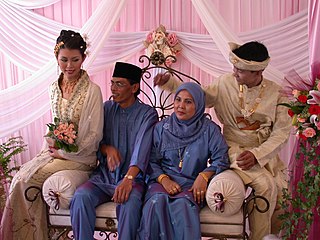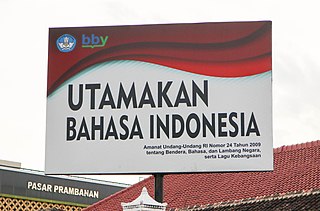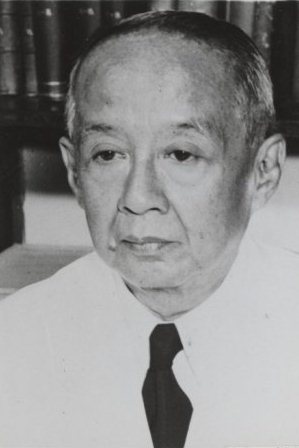
Minangkabau people, also known as Minang, are an Austronesian ethnic group native to the Minangkabau Highlands of West Sumatra, Indonesia. The Minangkabau's West Sumatera homelands was the seat of the Pagaruyung Kingdom, believed by early historians to have been the cradle of the Malay race, and the location of the Padri War.

Malay Singaporeans are Singaporeans with general ancestry from the Malay world. They constitute approximately 13.5% of the country's residents, making them the second largest ethnic group in Singapore. Under the Constitution of Singapore, they are recognised by the government as the indigenous people of the country, with Malay as the de jure national language of Singapore.

Djamaluddin Adinegoro was an Indonesian press pioneer. He is known as a reporter, writer, and political analyst. Through his writing in various newspapers, Adinegoro has made a great contribution in developing journalism and the Indonesian language. His name was immortalized as a journalism award in Indonesia: the Adinegoro Award. Djamaluddin was a younger half-brother of Muhammad Yamin.

More than 700 living languages are spoken in Indonesia. This figure indicates that Indonesia has about 10% of the world's languages, establishing its reputation as the second most linguistically diverse nation in the world after Papua New Guinea. Most languages belong to the Austronesian language family, while there are over 270 Papuan languages spoken in eastern Indonesia. The language most widely spoken as a native language is Javanese.

Indonesian literature is a term grouping various genres of South-East Asian literature.
Ali Akbar Navis was a prominent Indonesian author, poet, and humorist.

The Overseas Minangkabau is a demographic group of Minangkabau people of Minangkabau Highlands origin in Central Sumatra, Indonesia who have settled in other parts of the world. Over half of the Minangkabau people can be considered overseas Minangkabaus. They make up the majority of the population of Negeri Sembilan and Pekanbaru. They also form a significant minority in the populations of Jakarta, Bandung, Medan, Batam, Surabaya and Palembang in Indonesia as well as Kuala Lumpur, Malacca, Penang, Singapore and Brunei Darussalam in the rest of the Malay world. Minangkabaus have also emigrated as skilled professionals and merchants to the Netherlands, United States, Saudi Arabia and Australia. The matrilineal culture and economic conditions in West Sumatra have made the Minangkabau people one of the most mobile ethnic group in Maritime Southeast Asia.

Overseas Indonesians refers to Indonesians who live outside of Indonesia. These include citizens that have migrated to another country as well as people born abroad of Indonesian descent. According to Ministry of Law and Human Rights, more than 6 million Indonesians diaspora live abroad in 2023 this include ex-Indonesian citizens, foreign citizens who are children of Indonesian citizens, and children of ex-Indonesian citizens, illegal and undocumented workers.and according to the Director of Indonesian Citizen Protection, from that number 2,276,722 people are Indonesian citizens.

Agam Wispi is an Indonesian poet.

Tio Ie Soei was a peranakan Chinese writer and journalist active in the Dutch East Indies and Indonesia. Born in the capital at Batavia, Tio entered journalism while still a teenager. By 1911 he had begun writing fiction, publishing Sie Po Giok – his first novel – that year. Over the next 50 years Tio wrote extensively in several newspapers and magazines, serving as an editor for some. He also wrote several novels and biographies, including ones on Tan Sie Tat and Lie Kim Hok.

Iwa Koesoemasoemantri was an Indonesian politician. Born in Ciamis, West Java, Iwa graduated from legal school in the Dutch East Indies and Netherlands before spending time at a school in the Soviet Union. After returning to Indonesia he established himself as a lawyer, nationalist, and, later, a figure for workers' rights. During the first twenty years of Indonesia's independence Iwa held several cabinet positions. After retiring he continued to write. In 2002 Iwa was declared a National Hero of Indonesia.

The Indonesian Malaysians are Malaysian citizens of Indonesian ancestry. Today, there are many Malaysian Malays who have lineage from the Indonesian archipelago and have played an important role in the history and contributed to the development of Malaysia, they have been assimilated with other Malay communities and are grouped as part of the foreign Malays or anak dagang in terms of race. The Malaysian census does not categorize ethnic groups from the Indonesian archipelago as a separate ethnic group, but rather as Malay or Bumiputera.

Willem Iskander (1840–1876) was an Indonesian writer, nationalist, teacher and educator. He advocated for native Indonesian education in Dutch colonial times from North Sumatra. He founded Teacher Education School in 1862 in Tano Bato, Mandailing Natal Regency.

Abdullah Ahmad was an Islamic cleric (ulama) and reformist hailed from Padang Panjang, West Sumatra. He is a founder of Islamic mass organization based in West Sumatra, Sumatera Thawalib. He also founded the Islamic magazine Al-Munir, the first Islamic mass media in the Indonesian archipelago. Together with Abdul Karim Amrullah, he became one of the first Indonesians who received the honorable degree from Al-Azhar University in Cairo.

Sarimin Reksodihardjo was a Javanese bureaucrat and politician.
Parada Harahap was an important journalist and writer from the late colonial period and early independence era in Indonesia. In the 1930s, he was called the "king of the Java press". He pioneered a new kind of politically neutral Malay language newspaper in the 1930s which would cater to the rising middle class of the Indies.

Husein Jayadiningrat, or Hoesein Djajadiningrat in older spelling, was an Indonesian scholar in Indonesian studies, Islamic law, and native Indonesian literature. He distinguished himself as one of the first native Indonesian to earn a doctoral degree.

The Minangkabau Malaysians are citizens of the Malaysia whose ancestral roots are from Minangkabau of central Sumatra. This includes people born in the Malaysia who are of Minangkabau origin as well as Minangkabau who have migrated to Malaysia. Today, Minangkabau comprise about 989,000 people in Malaysia, and Malaysian law considers most of them to be Malays. They are majority in urban areas, which has traditionally had the highest education and a strong entrepreneurial spirit. The history of the Minangkabau migration to Malay peninsula has been recorded to have lasted a very long time. When the means of transportation were still using the ships by down the rivers and crossing the strait, many Minang people migrated to various regions such as Negeri Sembilan, Malacca, Penang, Kedah, Perak, and Pahang. Some scholars noted that the arrival of the Minangkabau to the Malay Peninsula occurred in the 12th century. This ethnic group moved in to peninsula at the height of the Sultanate of Malacca, and maintains the Adat Perpatih of matrilineal kinships system in Negeri Sembilan and north Malacca.

Mahyuddin Datuk Sutan Maharadja was a Minangkabau journalist, intellectual, activist and newspaper editor active in the Dutch East Indies. He is considered to be one of the fathers of modern Indonesian journalism and was a key figure in West Sumatran politics from the 1890s to 1921.
















